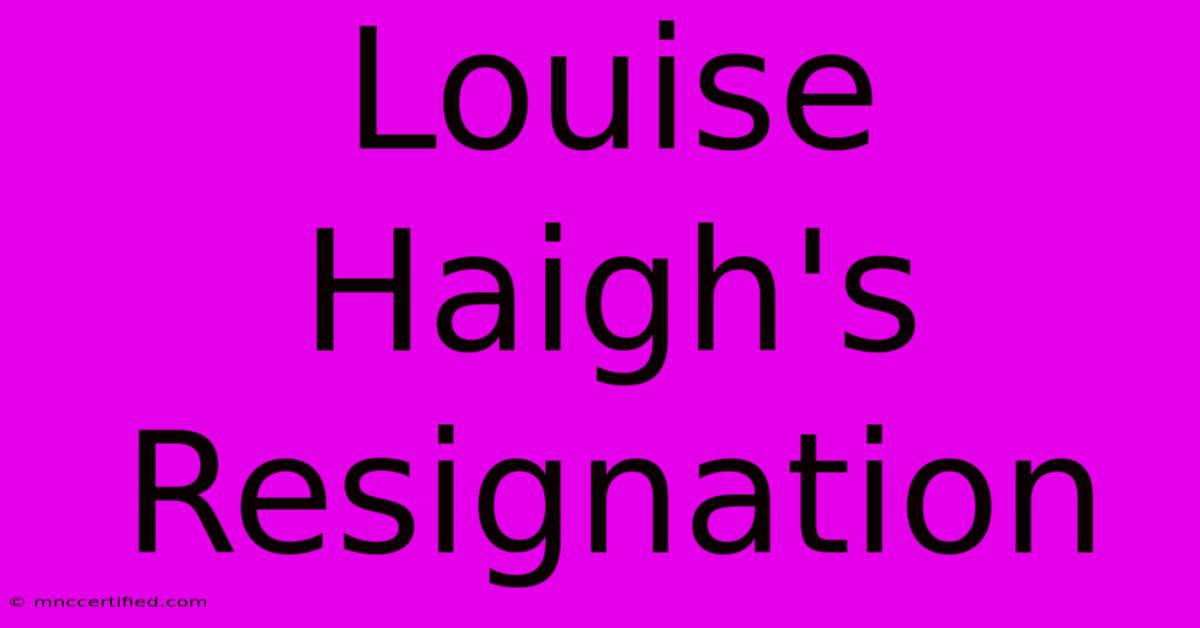Louise Haigh's Resignation

Table of Contents
Louise Haigh's Resignation: A Deep Dive into the Events and Aftermath
On October 26th, 2023, the political world was shaken by the surprise resignation of Louise Haigh from her position as Shadow Secretary of State for Transport. This unexpected move sparked immediate speculation and intense media scrutiny. This article will delve into the circumstances surrounding her resignation, analyzing the potential reasons and exploring the wider implications for the Labour Party.
The Announcement and Initial Reactions
Haigh's resignation statement, released via social media and traditional press outlets, was brief but impactful. While she expressed gratitude for the opportunity to serve, she offered no explicit reasons for her decision. This lack of clarity immediately fueled a frenzy of conjecture, with various theories circulating within political circles and across social media platforms. The Labour Party's initial response was similarly measured, acknowledging her contributions but offering little further explanation. This careful approach likely reflected the party's desire to avoid fueling further speculation and manage the potential damage to their image.
Potential Reasons Behind the Resignation
The absence of a clear explanation from Haigh herself has opened the floodgates to speculation. Several potential reasons have been suggested by political analysts and commentators:
Internal Party Disagreements:
One prominent theory centers on internal disagreements within the Labour Party's shadow cabinet. Potential sources of friction could include policy disagreements on transport infrastructure, differing approaches to tackling climate change within the transport sector, or even personality clashes with other senior figures. The lack of transparency makes it difficult to confirm these speculations, however, they remain plausible given the inherent complexities of party politics.
Personal Reasons:
Another possibility, and perhaps the most respectful to Haigh's privacy, is that personal reasons prompted her resignation. Stress, burnout, or family commitments are all factors that could understandably lead a high-profile politician to step down from such a demanding role. It's crucial to respect Haigh's personal life and avoid undue speculation in this regard.
Future Aspirations:
Some analysts suggest Haigh’s resignation might be a strategic move aimed at positioning herself for future advancement within the Labour Party. Stepping down from a high-profile, yet potentially challenging, role could allow her to focus on other aspects of her political career, paving the way for a different, potentially more influential, position in the future. This theory, however, is purely speculative at this stage.
The Impact on the Labour Party
Haigh's resignation, irrespective of the reasons, undoubtedly presents a challenge for the Labour Party. Losing a respected and relatively high-profile member of the shadow cabinet creates a void that needs to be filled. The party will need to consider the implications for their transport policy and the wider shadow cabinet structure. The appointment of her successor will be closely watched, with the party needing to choose a candidate who can effectively fill the void and maintain momentum on key transport-related issues. The overall impact will depend largely on how effectively the Labour Party manages the situation and addresses the underlying issues that may have contributed to Haigh’s decision.
Conclusion: Unanswered Questions and Future Developments
Louise Haigh's resignation remains shrouded in some mystery. The lack of a clear explanation leaves many questions unanswered and allows for considerable speculation. However, the event serves as a reminder of the intense pressures faced by politicians and the complexities of navigating internal party dynamics. As the situation unfolds, it will be crucial to follow developments closely to fully understand the implications of this significant political event. Further analysis and potential insights from future interviews or statements will be needed to paint a clearer picture of the situation and its impact. The upcoming months will likely reveal more about the true reasons behind Haigh's decision and its long-term consequences for the Labour Party.

Thank you for visiting our website wich cover about Louise Haigh's Resignation. We hope the information provided has been useful to you. Feel free to contact us if you have any questions or need further assistance. See you next time and dont miss to bookmark.
Featured Posts
-
Barbour Commander James Bond
Nov 30, 2024
-
Air Pods Black Friday 2024 Save Big
Nov 30, 2024
-
Black Friday Deals Expiring
Nov 30, 2024
-
College Football Predictions Ats
Nov 30, 2024
-
Haighs Resignation Phone Use Forces Transport Secretary Out
Nov 30, 2024